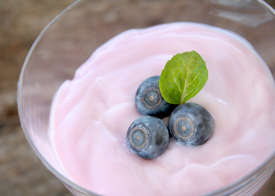 We’ve likely all seen that commercial on television about how eating yogurt with live cultures can help you stay regular and feeling great. Well, it’s true! Our bodies are home to thousands of both good and bad strains of bacteria called intestinal flora. Recent studies have shown that when bad bacteria outweigh the good, it can set the stage for several diseases including stomach ulcers, allergies, asthma, and even obesity! So, I’d like to spend a little time telling you how keeping your good bacteria at optimum levels can keep your immune system functioning properly and keep you illness-free.
We’ve likely all seen that commercial on television about how eating yogurt with live cultures can help you stay regular and feeling great. Well, it’s true! Our bodies are home to thousands of both good and bad strains of bacteria called intestinal flora. Recent studies have shown that when bad bacteria outweigh the good, it can set the stage for several diseases including stomach ulcers, allergies, asthma, and even obesity! So, I’d like to spend a little time telling you how keeping your good bacteria at optimum levels can keep your immune system functioning properly and keep you illness-free.
The Good, The Bad, and the Healthy
We come into the world with about 90% friendly bacteria onboard that help us ward off illness outside the womb. But once we pass the age of 40, our good bacteria have decreased to about 10-15% of what we originally had as infants. This ratio is almost completely opposite to what we should have. Good bacteria help digest everything we eat and balance the acidic environment of our intestines to prevent yeast overgrowth, bloating, gas, and inflammation. If the good bacteria decrease too much, bad bacteria can overgrow and cause intestinal upsets and possibly lead to more serious illnesses.
Symptoms of Intestinal Bacteria Imbalance
Some tell-tale signs that your intestinal bacteria are out of balance include:
- Bloating, gas, constipation/diarrhea, cramps.
- Headaches, chronic nasal congestion/post nasal drip
- Chronic fatigue
- Weight change extremes: Gaining/losing too much.
- Joint pain and other inflammatory conditions
- Allergies/asthma
What’s A Good-Bacteria Promoting Diet?
I tell my patients to begin with a basically healthy diet that includes 5-10 fruits/vegetables every day; no more than 30% fat (10% saturated, 20% unsaturated); 25-30 grams fiber daily, dairy products for calcium, with adequate protein, and water intake. To that basic recipe, I offer the following suggestions:
- Limit simple sugars like high fructose corn syrup (need to read labels), sucrose (plain table sugar), and alcohol (metabolized as a sugar). Bad bacteria thrive on these. Instead, the sugars found in fruit, vegetables, legumes, are the types that build good bacteria.
- Limit animal fat as it promotes bad bacteria.
- Limit starches like bread, pasta, white rice to a few servings a day, as they can cause too much acid in your system which bad bacteria thrive on.
- You can still enjoy meat and chicken, but try to stick to those raised without antibiotics as these types promote good bacteria.
- Add 8 oz yogurt, or a drink called kefir (both found in your grocer’s dairy section), daily. Look for the LAC logo on cartons that insure live active cultures that promote good bacteria. Other foods that create good bacteria are sauerkraut, tofu, and soy products.
- Maintain adequate B vitamins, particularly folate and B12 which help you absorb nutrients.
- Enjoy green or black tea everyday, and add a little garlic to your salads, pasta and fish dishes. These increase your good bacteria levels.
- Take a good multivitamin as insurance to get optimum levels of all the vitamins, minerals and other nutrients you need.
- Antibiotics. These deplete good bacteria and can cause intestinal upsets. If I have to prescribe antibiotics to my patients, I also tell them to eat yogurt containing live, active cultures everyday they’re on the antibiotics. This rebuilds their good bacteria and prevents intestinal upsets.
- Probiotic supplements can help those over 40 to balance age-related good bacteria deficiencies. Active cultures should number in the 10 billions (read label) and should contain lactobacillus acidophilus, bifidobacteria, and Saccharomyces. However, if you have a compromised immune system from other illnesses, ask your doctor about choosing the best probiotic supplement to prevent ingesting potentially harmful (to you) bacteria.
Maintaining a strong immune system and good health doesn’t have to be a difficult or too-restrictive chore. Remember, it’s all about maintaining a good balance. With a little effort on your part, reading labels closely and following some of my suggestions here, it is possible to create and preserve good health well into old age by simply lending a helping hand to our friendly bacteria!
Stay Well,
Mark Rosenberg, M.D.
